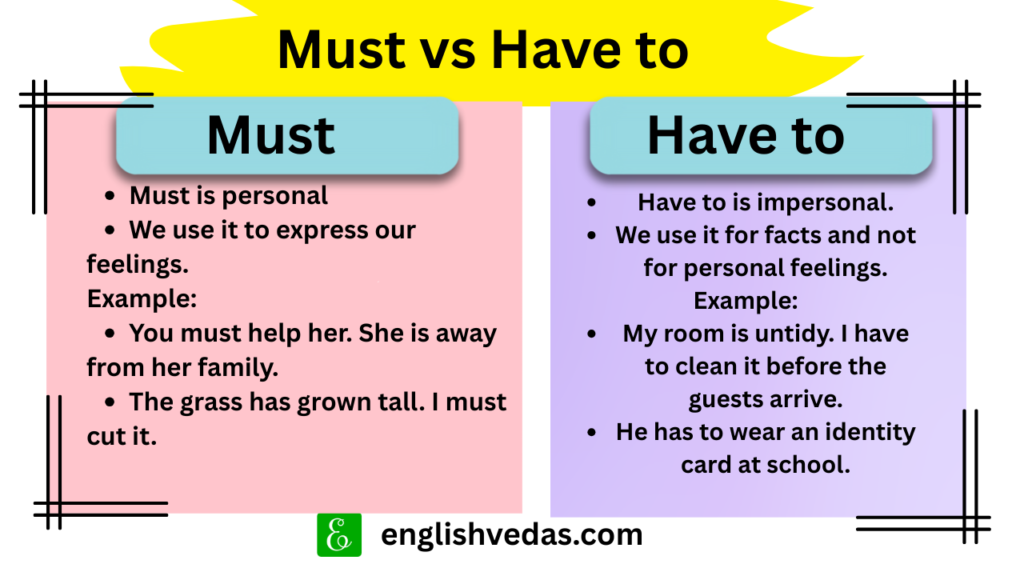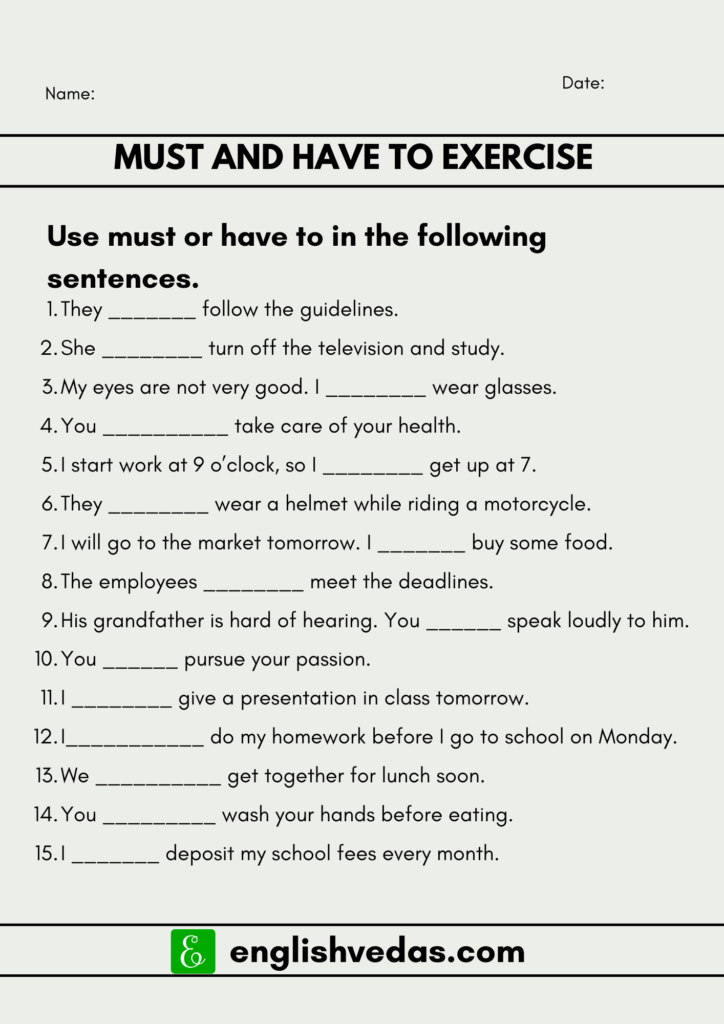‘Must’ refers to advice that comes from a speaker. It indicates personal obligation, whereas ‘have to’ refers to a rule that a person must follow. It is an external requirement.
In this article, you will learn the difference between must and have to, exercises, and the use of must and have to.
We use must and have to to say that it is necessary to do something.
- I am late for my class. I must go or have to go.
There is a difference between ‘must’ and ‘have to’, and it is important to understand this.

1. What is the difference between must and have to?
- Must is personal.
- We must when we want to express our feelings.
- ‘You must help her.’ = ‘I’ (the speaker) say it is necessary.
- He is an intelligent boy. You must study with him.
- I haven’t cooked meat for many days. I must cook meat tonight.
- Have to is impersonal.
- We use have to for facts and not for personal feelings.
- You have to do something because the situation demands it.
- You can’t borrow books from the city library without a membership. You have to pay a membership fee.
- My room is untidy. I have to clean it before the guests arrive.
- If you are in doubt, it is safer to use have to.
Must + infinitive (must read/ must see, etc.)
| I we you they He she it | must | Do Stop Read sing |
Example sentences: –
- The grass has grown tall. I must cut it.
- It’s a good book. You must read it.
- Robin must see the doctor today. He is sick.
2. What is the use of must and have to?
- We use must to talk about the present or the future.
- It refers to a strong personal obligation.
- The speaker thinks that it is necessary to do something and shows urgency.
Examples: –
- You must follow traffic rules.
- I must call my father.
- We use have to for external obligation or requirement.
- The necessity to do something comes from rules, laws, or instructions.
Examples: –
- I have to pay my school fees.
- He has to wear an identity card at school.
The word must sounds more serious, whereas have to sounds neutral and is commonly used in speaking.
In questions and negative sentences with have to, we use do/does/did.
- I am not going to school tomorrow, so I don’t have to get up early.
- Why did you have to go to the bank?
- What do I have to do to get a government job?
- Do you have to work on Sundays?
- She doesn’t have to learn German.
For past (yesterday, last week, etc.) we use had to (not must).
- We had to see the dentist yesterday.
- They had to walk home yesterday afternoon. They missed their school bus.
3. What is the difference between have to and have got to?
Sometimes we use have to instead of have got to.
Have/has are used in the contracted form before the subject.
Example: I’ve is written as I’ve to.
I have got to is written as I’ve got to.
Let us understand the three ways of saying the same thing.
- I’ve got to do my homework before I can watch television.
- I have got to do my homework before I can watch television.
- I have to do my homework before I can watch television.
Some more examples:
- We have got to see the doctor. (we must see the doctor).
- He’s got to get up early or he won’t get a taxi. (He must get up early).
- She’s got to stop worrying about unnecessary things. (She must stop worrying).
Here are two sentences:
- I have to cut the grass.
- I’ve got to cut the grass.
They both mean the same thing, but in the first, adverb of frequency is used that is have to.

Must and Have to Exercise with Answers
Put in must or have to.
- They _______ follow the guidelines.
- She ________ turn off the television and study.
- My eyes are not very good. I ________ wear glasses.
- You __________ take care of your health.
- I start work at 9 o’clock, so I ________ get up at 7.
- They ________ wear a helmet while riding a motorcycle.
- I will go to the market tomorrow. I _______ buy some food.
- The employees ________ meet the deadlines.
- His grandfather is hard of hearing. You ______ speak loudly to him.
- You ______ pursue your passion.
- I ________ give a presentation in class tomorrow.
- I___________ do my homework before I go to school on Monday.
- We __________ get together for lunch soon.
- You _________ wash your hands before eating.
- I _______ deposit my school fees every month.
- You ________ remember to send a birthday card to your friend.
- He ________ get to the station an hour before the train departs.
- Do I ________ wear a tie to work?
- The doctor told Fiona she ______ take medicines on time.
- I __________ finish this task by 6.00 pm.
Answers: –
- Must
- Must
- Have to
- Must
- Have to
- Must
- Have to
- Must
- Have to
- Must
- Have to
- Have to
- Must
- Must
- Have to
- Must
- Must
- Have to
- Have to
- Have to
Frequently Asked Questions:-
1. What is the difference between “must” and “have to”?
“Must” is used when we express our personal feelings or give strong advice.
Example: You must see a doctor.
“Have to” is impersonal and is used for obligation related to rule or a situation.
Example: I must join spoken English classes to improve my communication skills.
2. When to use should, must, and have to?
We use “must” and “have to” to say that it is necessary to do something. We use them to talk about obligation. “Should” is used to talk about advice. It states that it is the right thing to do.
3. Do I have to or must I?
“Do I have to….?” It is commonly used in English. It is used for external rules or necessity.
Do I have to wash all the clothes today?
“Must I…?” is more formal and is used to talk about the necessity to do something.
Must I attend the marriage ceremony?
4. How to use “have to” and “must” in questions?
We can use “have to” in questions.
Example: Do you have to work on Sundays?
We can use “must” in questions.
Example: Must you be this rude?
5. Can “must” and “have to” be used interchangeably?
Yes, we can use “must” and “have to” interchangeably. Must sounds stronger and more formal.
It is used interchangeably when you give your opinion.
Example: It is a fantastic film. You must see it or You have to see it.
6. How to use negative forms of “must” and “have to”?
The negative form of “must” is “mustn’t” which means it is necessary not to do it, it is the wrong thing to do it.
Example: You mustn’t touch the pictures.
The negative form of “have to “ is “Don’t have to”. It means that you are not required to do it.
Example: You don’t have to water the plants today.
7. Can we use “must” in the past tense?
No. “Must” has no past tense form.
The past tense form of “have to” is “had to”.
Example: We had to walk home last night. There were no buses.
8. Can we use “have to” in questions?
Yes. We can use “have to” in questions.
Example: Do I have to pay to enter the adventure park?
9. Which is more formal —“must” or “have to”?
“Must” is more formal and is commonly used in written or Spoken English.
Example: All passengers must wear seatbelts.
Also Read:-
- Present Perfect Tense Active and Passive Voice Exercise: 50 Sentences
- Mastering Each and Every Difference Use 30 Example Sentences: Best
- Mastering the Past Perfect Continuous Tense: 30 Example Sentences and Exercises to Boost Your Grammar Skills
- The Future Perfect Tense: The Ultimate Guide to Example Formula Sentences & Their Structure!

Written by Sukhjit Kaur, English educator with 17+ years of experience helping students master grammar and writing. Through EnglishVedas.com, she simplifies English grammar using examples from daily life and classrooms.

